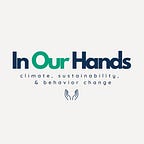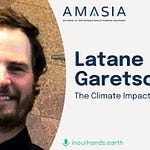In this episode, Ramanan Raghavendran speaks with Kim Wolske, a research associate professor at the University of Chicago Harris School of Public Policy. They discuss social norms around climate, barriers to low-carbon choices, and the Inflation Reduction Act. Wolske also shares valuable advice for early-stage founders focused on climate. Full transcript available above. This episode is also available on Apple Podcasts and Spotify.
In Our Hands is a production of Amasia. Follow these links for more about our firm, the Amasia blog, our climate fiction podcast, and Ramanan’s blog.
Highlights
[00:04:29] Reasonably Achievable Emissions Reduction
[00:12:54] Barriers to Low Carbon Choices
[00:17:22] Inflation Reduction Act
[00:21:35] Advice for Behaviorally Minded Companies












